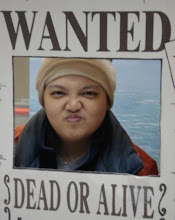Eh-hum # 280
An opinion article from the Inquirer asked this question: What if Estrada becomes president again?
"Perish the thought!", says me who joined People Power II ousting Estrada. What makes the ousted and convicted ex-President think that he is qualified to run this country? He's no better than the current regime.
There are two major things that caught my attention in his artice: (1) his list of senatorial candidates for the opposition and (2) his answer on how he will solve the situation in Mindanao. I did not include the debate of whether he can indeed run again (his civil rights have been restored due to the pardon), since I have no legal background.
His senatorial lists consists of the following: Reelectionist Senators Juan Ponce Enrile, Miriam Defensor-Santiago and Jinggoy Estrada, former Sen. Sergio Osmeña III, Parañaque Rep. Roilo Golez and Bayan Muna party-list Rep. Teodoro Casiño (oh really now), United Opposition spokesman Adel Tamano, Aquilino “Koko” Pimentel III, broadcast journalist Ted Failon, Grace Poe, daughter of bosom friend Fernando Poe Jr. (WTF?!?), and incarcerated Brig. Gen. Danny Lim. Meanwhile, former Sen. Agapito “Butz” Aquino and Makati Mayor Jejomar “Jojo” Binay were listed as "reserves".
I am not going to elaborate, but this pretty much shows how f*cked up Pinoy politics is, which is run by political dynasties, serial balimbings, trapos, and people who have NO experience in Public Administration, Public Policy whatsoever.
So, how will the "Kumpare King" solve the crisis in Mindanao?
"Di ba almost solved na yon when I was ousted?” he said. “Camp Abubakar had been captured by the AFP. Now Gloria has given it back to the MILF.”
Yep, all-out war. Nothing has changed.
So, how will the "Kumpare King" solve the crisis in Mindanao?
"Di ba almost solved na yon when I was ousted?” he said. “Camp Abubakar had been captured by the AFP. Now Gloria has given it back to the MILF.”
Yep, all-out war. Nothing has changed.






